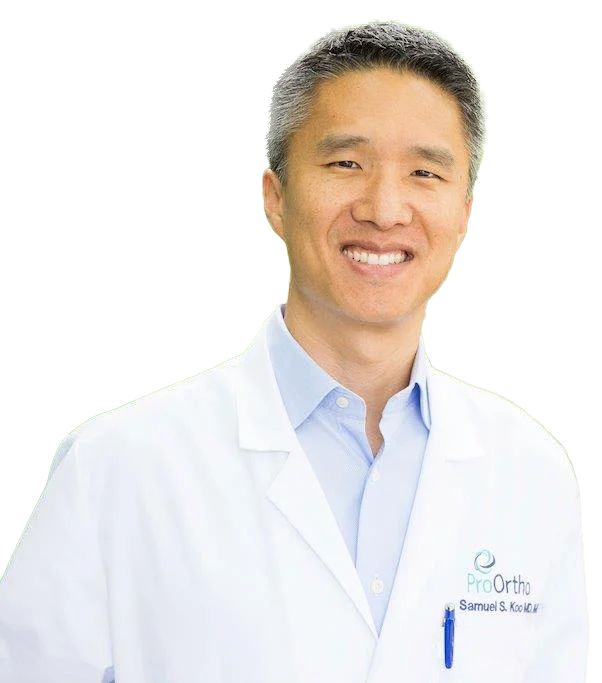Shoulder Replacement Surgery in Seattle
Expert in Shoulder Replacement Surgery Helping Patients from Seattle, Redmond, Bellevue, Kirkland, and the Surrounding Area
Non-operative treatment of shoulder arthritis consists of activity modification, anti-inflammatory medications, and steroid injections. Surgical treatment consists of a shoulder replacement. In a shoulder replacement, either the entire shoulder is replaced (total shoulder replacement), or just the humeral head is replaced (hemiarthroplasty). Patients in Seattle with rotator cuff arthropathy may require a special type of shoulder replacement known as a reverse shoulder replacement. The choice of replacement is individualized based on the patient. Shoulder replacement is now done by Dr. Koo on an outpatient basis for most patients. Occasionally patients stay one night in the hospital.
When is Shoulder Replacement Surgery Needed?
There are several reasons why a shoulder replacement surgery may be recommended by Dr. Koo. Patients who will benefit from the surgery may be experiencing:
- Loss of motion or weakness in the shoulder
- Severe shoulder pain that interferes with everyday activities
- Moderate to severe shoulder pain while resting, which may interfere with sleep
Seattle patients who have not shown improved symptoms with nonsurgical treatment options such as anti-inflammatory medications, physical therapy or cortisone shots are typically good candidates for shoulder replacement surgery with Dr. Koo at his office in Kirkland WA.
What are the causes for Shoulder Replacement Surgery?
There are several conditions that can lead patients to consider shoulder joint replacement surgery.
The most common type of shoulder arthritis is osteoarthritis, or degenerative joint disease. This occurs when the cartilage, which normally acts as a protective cover for the bones, degenerates. Without this cartilage to act as a buffer, the affected bones rub against one another, wearing each other down and resulting in pain and swelling. Sometimes, this friction also results in the development of bone spurs which are painful and interfere with movement.
Rheumatoid Arthritis
Rheumatoid arthritis (RA) is an autoimmune disease. In rheumatoid arthritis, the lining of the joints as well as the cartilage is affected, causing painful swelling and redness and potentially resulting in bone erosion and even deformity of affected joints. Unlike osteoarthritis, RA may cause symptoms of fever and fatigue and is a symmetrical disease, usually affecting the same joint on both sides of the body. Another distinction is that in rheumatoid arthritis, stiffness and pain occur even at rest, whereas with osteoarthritis the symptoms are more apparent with movement than after periods of rest.
Post-traumatic Arthritis
Post-traumatic arthritis is a form of osteoarthritis that develops after a traumatic injury, such as a fracture or dislocation of the shoulder, and may occur at any age.
Avascular Necrosis
Avascular necrosis (AVN) occurs when the blood supply to the ball (humeral head) at the top of the arm bone is interrupted. AVN can ultimately lead to the death, or necrosis, of the bone cells in the humeral head and may eventually result in shoulder arthritis. In addition to occurring after injury, AVN may be caused by alcoholism or use of steroids.
Severe Shoulder Fractures
A severe shoulder fracture is another common reason to undergo shoulder replacement surgery. This is especially typical among older patients with osteoporosis as they are at a higher risk for severe shoulder fractures. If the head of the upper arm bone is shattered, it can be very difficult for a doctor to repair. The blood supply to the bone pieces can also be interrupted, presenting additional complications. In cases like these, a shoulder replacement surgery may be the only option to restore the shoulder’s proper function and range of motion.
What are the Types of Shoulder Replacement Procedures?
There are several types of shoulder replacement surgeries offered by Dr. Koo to patients living near the Seattle Metro area.
Total Shoulder Replacement
A total shoulder replacement is performed on patients who have an extensive amount of damage to their articular cartilage. This procedure removes the damaged cartilage and replaces it with durable prosthetic parts. This procedure is performed in 3 steps:
- The humerus head is removed and replaced: once the “ball” section of the upper arm bone is removed, a metal stem is attached.
- A round metal ball is attached to the metal stem: a smooth metal ball is placed on top of the newly inserted metal stem.
- Cartilage is removed from the arm socket: the damaged cartilage is removed from the socket and replaced by a smooth artificial socket.
Stemmed Hemiarthroplasty
In cases where the cartilage in the socket is in good condition, the surgeon may choose to perform a stemmed hemiarthroplasty. During this procedure, the first two steps of a total shoulder replacement are performed. The ball of the humerus is removed and replaced with a metal stem and prosthetic metal ball that works in tandem with the intact shoulder socket and cartilage.
Reverse Total Shoulder Replacement
A reverse total shoulder replacement is performed on patients who have completely torn their rotator cuff or those who have severe arthritis with a rotator cuff tear or weakness. In a reverse total shoulder replacement, the socket and metal ball are switched. The prosthetic ball is placed in the existing shoulder socket and the plastic socket prosthesis is attached to the top of the humerus. This allows the patient to lift their arm using their deltoid muscle instead of the weakened or torn rotator cuff.
Learn more about Seattle Shoulder Replacement
Schedule a Shoulder Replacement Consultation
To schedule an appointment for shoulder replacement surgery in the Seattle, WA area, contact shoulder surgeon Samuel Koo, MD, MPH at (425) 823-4000, or request an appointment through our secure online form. Dr. Koo performed over 375 shoulder surgeries in the past year alone, so you know you’d be in good hands. Our office is located in Kirkland, just a short drive from Redmond, Bellevue, and Seattle.

